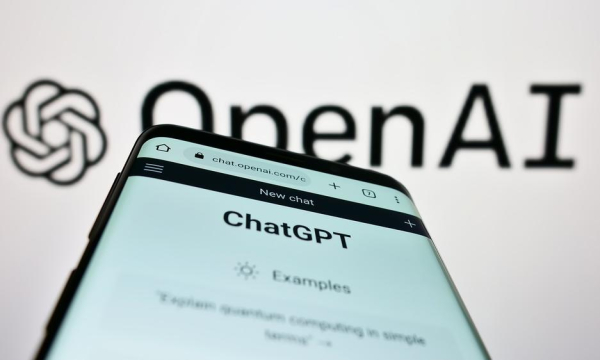ChatGPT is the equivalent of the Google search engine from 20 years ago. Until now, people used to say “ask Google,” but now they increasingly say “ask ChatGPT,” Bartosz Wójcik, author of the report “How do Polish internet users use ChatGPT?” by Gemius and Polish Internet Research, told PAP.

The expert emphasized that ChatGPT's popularity stems, among other things, from the need for quick access to online content. “We no longer have to launch a search engine, browse websites, read and filter information. All we need is a single text field in which we enter or dictate a question, and in return, we receive a ready-made answer,” he said.
Google from 20 years ago
The study also shows that the average user spends over two hours per month on ChatGPT. People aged 25-34 spend the most time there – an average of 2 hours and 42 minutes in June – and their number exceeded 2.1 million. The analysis also revealed an overrepresentation among the youngest users, aged 7-14.
In terms of gender, the report shows a predominance of women using ChatGPT – their number reached nearly 4.93 million, while men accounted for approximately 4.4 million. According to the expert, this may be due to differences between population structure and reach. “Women have a slight predominance among internet users. In June, women constituted approximately 51.4%,” he assessed, noting that the situation is similar for place of residence and education.
The study's author compared GPT to “Google from twenty years ago.” “Until now, people used to say 'ask Google,' but now we increasingly hear 'ask ChatGPT.' Its popularity is so great that the name itself has become synonymous with other artificial intelligence tools,” he emphasized. He believes the number of active AI users will grow in the coming years, and using such tools will become a natural part of everyday online life.

On August 7th, OpenAI unveiled its new GPT-5 model , which it calls “the smartest, fastest, and most useful.” The company emphasized that prior to its launch, it established safety and mental health advisory groups, including more than 90 doctors and specialists, to develop mechanisms for detecting emotional issues in users.
– OpenAI first flooded the world with its application, and now it is dealing with the side effects – commented Konrad Maj, a psychologist from SWPS University, head of the Center for Social and Technological Innovation “HumanTech”.
He emphasized that similar phenomena have been observed previously on social media. Time will tell whether these activities will truly and effectively benefit mental health, or whether they will merely be a PR stunt, he added.
OpenAI has also decided to introduce incentives for taking breaks from using ChatGPT. These include notifications about time spent using the AI, such as a message like “Would you like to take a break?”, suggestions for breathing exercises, and mindfulness techniques to reduce stress during intense work. ChatGPT would also continuously analyze the user's typing and suggest educational materials about mental health or a visit to a professional if the conversation indicates emotional distress.
According to psychologist Konrad Maj, “it's a step towards digital hygiene.” “Break notifications remind me of a school bell, signaling it's time to get out of bed and stretch your legs. Breathing exercises or mindfulness techniques can help reduce tension, but it's important to remember that people in a mental health crisis may not respond to such suggestions,” he said, adding that, in his opinion, “another key question is whether OpenAI has commissioned any studies demonstrating the effectiveness of such incentives to take a break, and on what basis was it determined when the system should send alerts?” “It's also crucial that AI clearly communicates its limitations from the outset—that it's an informational support, not a therapist,” he emphasized.
The psychologist stated that research on the anthropomorphization of technology, including his team's, shows that the youngest users rarely maintain a critical distance. “They may accept answers without thought, omitting independent verification of information. Conversation with an AI does not replace contact with a human, who provides tone of voice, gestures, and gaze—the foundations of interpersonal skills. Giving an AI a human voice is particularly dangerous, because the mind interprets this as contact with a rational being,” he assessed.
The resort is working on protection
Deputy Prime Minister and Minister of Digital Affairs Krzysztof Gawkowski, when asked in the PAP studio whether, due to the growing involvement of children, among others, in using ChatGPT, additional safeguards should be introduced at the national level, replied that “the ministry is working on a law that will also provide greater opportunities to protect what the algorithm and artificial intelligence do to human life.”
“The European Accessibility Act (EIA-Act, an EU directive that specifies requirements for the digital accessibility of products and services – PAP) is being implemented in Poland today, and work has already begun. When it comes to language models, they should be treated just like the entire internet. That means explaining the dangers, talking a lot about digital hygiene and digital ethics, and building lessons,” said the Deputy Prime Minister, noting that such “digital lessons” are taking place across Poland. “We have free materials, which we send to schools so that teachers, parents, and students can build their understanding of the digital world around them,” he explained.
“I'm a fan of digitalization, but also of digital hygiene, and this will always be one of the guiding principles in the ministry I will lead,” Gawkowski said. “We must explain that new technologies also bring risks that young people must be aware of, and at the same time, we must make parents aware of this, who sometimes, without thinking about what might happen, share devices and say: have fun,” Gawkowski emphasized.
The ChatGPT report (web and mobile versions) from Gemius and Polish Internet Research is based on research by Mediapanel. Data for the ChatGPT mobile app has been available in the study since February 26, 2025. Previous data includes only data for the browser version.
Mediapanel is a single-source cross-media study, encompassing passive measurement of internet, television, radio, and outdoor advertising consumption. It is implemented in collaboration with Gemius, Polish Internet Research, the Radio Research Committee, and the OOHlife Chamber of Commerce. The study's results allow for the determination of the total reach of individual media channels and the estimation of the potential of entire media groups. (PAP)
mbed/ bst/ mhr/






